Stadion Energa Gdańsk: Lechia Gdańsk
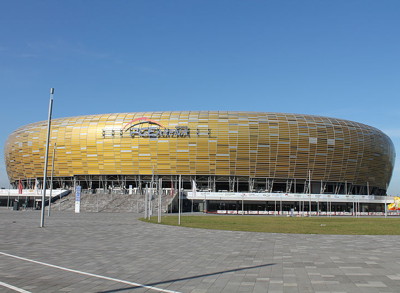
Jakub Murat (Muri) [CC BY-SA 4.0], via Wikimedia Commons
It’s fair to say that the Stadion Gdańsk (currently known as Polsat Plus Arena Gdansk for sponsorship reasons) would almost certainly have been a stadium that most football supporters didn’t even know existed if it hadn’t been selected as the venue for the final of the 2020 Europa League. Its use came on the back of the Olympic Stadium in Baku having been the final venue the year before, though, so it was noteworthy for being easier to get to if nothing else. The home of Lechia Gdańsk wasn’t exactly high up on the list of priorities when ht came to stadium visits for most English football fans prior to 2020, but they at least had to Google it once it became clear that there was a chance that a team they support might end up playing a match there.
It is perhaps damning it with faint praise to suggest that the Europa League final is the only reason for the stadium to make an impression on football fans, though, when you consider that it is the third largest stadium in Poland. It took three years to build and cost a little over €200 million, hosting four Euro 2012 matches when the honour of doing so was shared between Poland and Ukraine. That included Germany’s 4-2 quarter-final victory over Greece and all three of Spain’s Group C matches earlier in the tournament. That was because it had been built with one eye on hosting the matches, being part of the Polish bid for the Championships.
Stats
| Stadion Energa Gdańsk Stats | |
|---|---|
| Year Opened | 2011 |
| Capacity | 43615 |
| Average Attendance | 14746 |
| Record Attendance | 40392 (Poland v Netherlands (2016)) |
| Pitch Size | 105 x 68 (7140) |
| Former Name | Baltic Arena, PGE Arena Gdańsk, Arena Gdańsk, Stadion w Gdańsku Letnicy |
| Owner | City of Gdańsk |
| Sponsor | Energa SA |
| Clubs Hosted | Lechia Gdańsk |
| First Fixture | Lechia Gdańsk v KS Cracovia (14/08/2011) |
| Lechia Gdańsk Stats | |
|---|---|
| Year Founded | 1945 |
| Nickname | Gdańskie Lwy (Gedanian Lions), Pasiaki (The stripes), Biało-Zieloni (White-Greens) Lechiści (Lechistas) |
| Rivals | Arka Gdynia |
| Previous Stadiums | MOSiR Stadium |
| Kit | White with Green Pattern (Home) / Dark Grey & Green (Away) |
| Training Ground | Unknown |
| Shirt Sponsor | Energa |
| Team Owner | Wroclawskie Centrum finansowo |
| Record Goalscorer | Roman Rogocz (109) |
Stadion Energa Gdańsk Photos
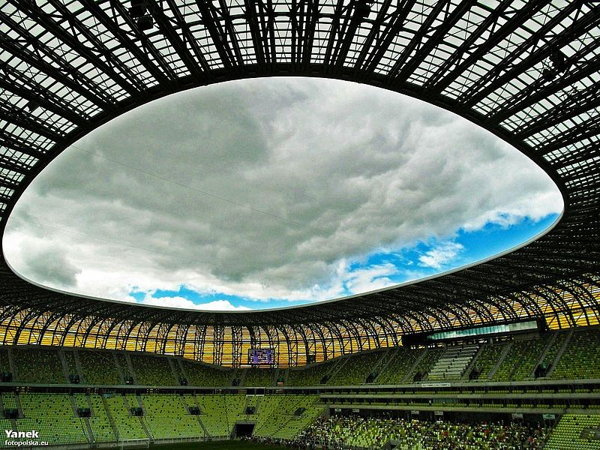
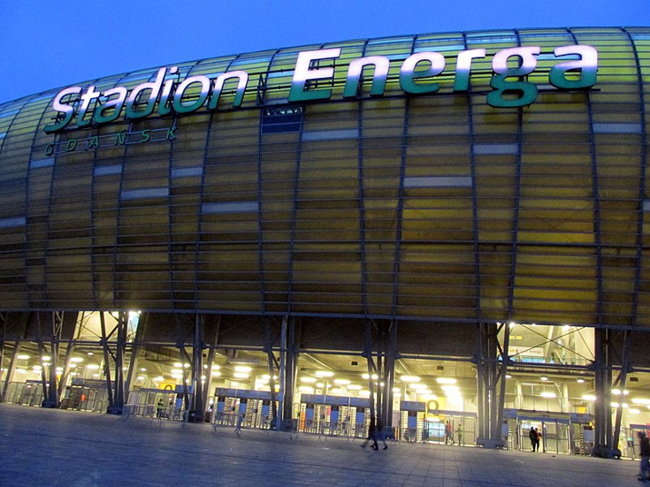
Tomasz Sienicki [user: tsca, mail: tomasz.sienicki at gmail.com], CC BY 4.0, via Wikimedia Commons
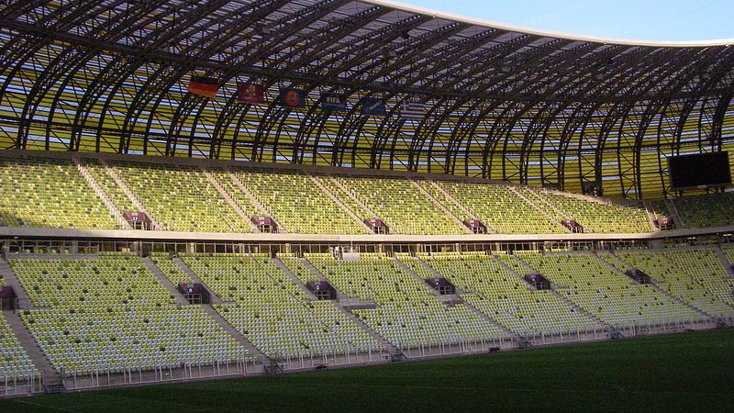
Stadion Energa Gdańsk Seating Plan and Where to Sit
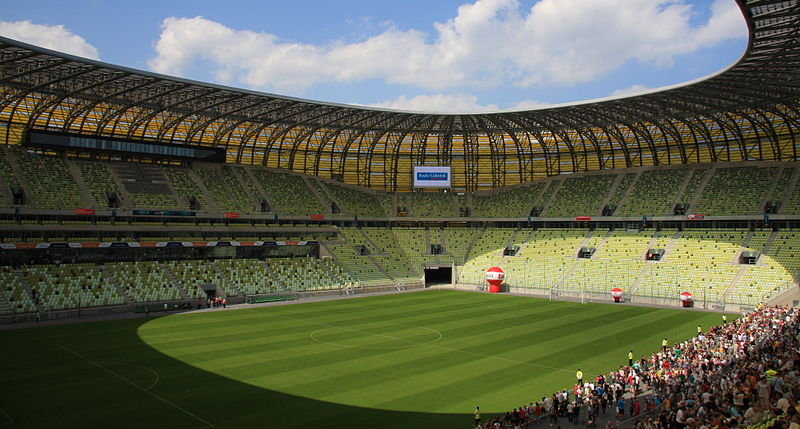
As with most modern stadiums, the Stadion Gdańsk is designed in a bowl style of continuous seating. The bowl runs around the perimeter of the pitch and the seating is split into two tiers.
Lechia Gdańsk Ticket Prices
Ticket prices for Lechia Gdańsk matches vary year-on-year, so if you want the latest information then your best bet is to contact the club directly. As of 2022 the pricing structure was split into two, with the better seats priced at 4PLN and 30PLN for concessions, while the less good seats were priced at 35PLN and 15PLN respectively. 45PLN is about £8.50 so it’s very cheap to watch a game here.
How To Get Lechia Gdańsk Tickets
The club’s website gives you plenty of information about purchasing tickets, which you can do directly from them. You don’t need a fan card to do so and can pick up tickets from the club’s fanstore, at the stadium’s ticket office and via numerous partnership points.
Where to Buy
Getting To Stadion Energa Gdańsk
Train – A train journey from London to Gdańsk will take about 22 hours, boasting as many as 7 changes depending on the route you take. Far more likely is the notion of flying into Poland and then heading to the stadium from within the country itself. It’s about 3 miles from the Gdańsk train station and tram number 10 will take you there.
Bus – There is a stop right outside the stadium where the Węzeł Harfa 01 stops, with the AmberExpo 01 and 02 also stopping nearby.
Car – The Stadion Gdańsk is just off the 91 motorway.
By Air – There are a number of airports that serve the city, but the closest international one is the Gdańsk Lech Wałęsa Airport, which is about 15 miles away.
Taxi – A taxi from the centre of Gdańsk out to the ground will cost about 25 Polish złoty and should take in the region of 20 minutes to complete its journey. Don’t forget this will almost certainly take longer on match days, though.
Parking Near Stadion Energa Gdańsk
It is possible to park at the Stadion Gdańsk on match days, but it isn’t easy and there aren’t loads of spaces, so maybe consider options such as leaving your car at your hotel.
Useful Resources
Stadion Energa Gdańsk Hotels
We all need somewhere to sleep/pass out at the end of a busy day of football, and what better place to do it than one of these fine establishments?
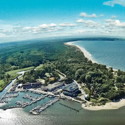
Hotel Galion - £50+
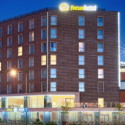
Focus Hotel Premium Gdańsk - £70+
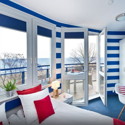
Willa Marina - £90+
Pubs and Bars Near Stadion Energa Gdańsk
Lots of sporty places to drink in Gdansk apparently.
T29 Sports Pub
Sports Pub
Kinguin Esports Lounge
Facilities
The facilities within the Stadion Gdańsk are decent enough, but it’s important to put that into context. Ultimately we’re taking about a mid-table Polish team’s stadium here, not the latest greatest one built with the finances available to a Premier League team. You’ll be able to use the loo without feeling like you need to have a shower, but don’t be expecting linen towels and Bayliss & Harding soap when you go to wash your hands.
Hospitality
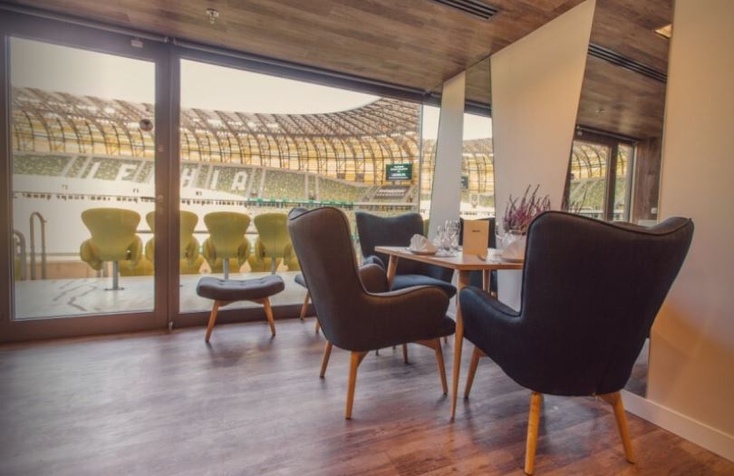
UEFA’s executives aren’t quite as bothered about being able to get their snouts in the trough at Europa League matches as they are during the Champions League, but it still matters to them to be able to enjoy themselves when they’re taking tickets away from actual football supporters and so the Stadion Gdańsk’s facilities are impressive enough to keep them interested.
Private Hire
The majority of football stadiums that have nice spots for those that enjoy hospitality packages to watch the match also tend to hire out those areas when there’s no match being played. The same is true of Lechia Gdańsk, so if you want to hire the ground out then get in touch with the club and they’ll let you know how it works. They have spaces to suit all kinds of occasions.
Stadium Tours & Museum
You can indeed do tours of the stadium, which will cost between 10 and 15 złoty depending on your age. They leave regularly between 10am and 4pm
About Lechia Gdańsk
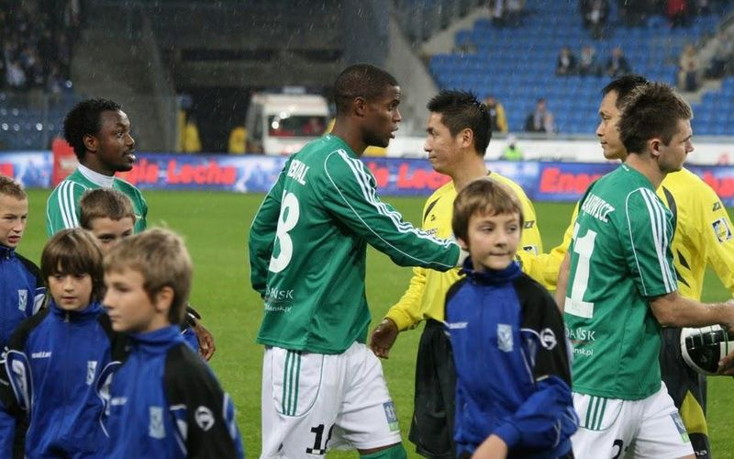
Lechia Gdańsk aren’t one of Poland’s more famous football teams, though they were something of a sporting powerhouse during the 1950s. Founded in 1945 by supporters that were expelled from Lwów, one of Poland’s oldest football teams, the side was originally known as BOP Baltia Gdańsk and was a team for the Port Reconstruction Office. In February of 1946 there was a meeting in which the idea of changing to club’s name was mooted, with the choice being to go for the much snappier name of Sports Club for the Port Reconstruction Office Lechia Gdańsk.
The club’s best performance in the top-flight of Polish football, the Ekstraklasa, was to finish 3rd in both 1956 and 2019. They have enjoyed a touch more success than that over the years, though, winning the Polish Cup in 1983 and 2019, as well as adding the Polish SuperCup in 1983. They’ve enjoyed two seasons in Europe at the time of writing, with the first coming in the 1983-1984 season when they lost to Juventus in the European Cup Winners’ Cup, as well as a Europa League campaign in the 2019-2020 season.
Stadion Energa Gdańsk History
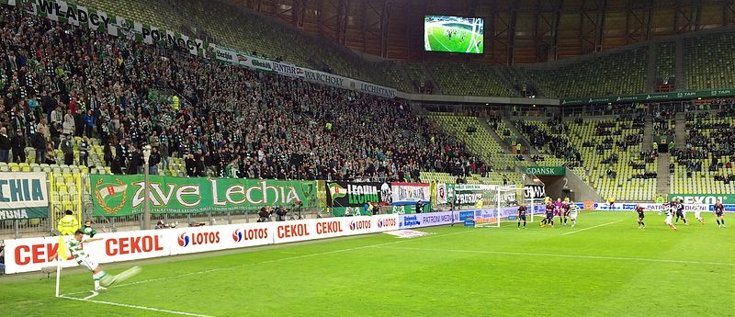
The Stadion Gdańsk is a relatively young stadium when compared with some of those covered on this site, having opened its doors for the first time for a match between Lechia Gdańsk and Cracovia on the 14th of August 2011. The first international match hosted by the venue was between Poland and Germany on the 6th of September the same year. Both matches ended in draws, with the first one being 1-1 and the second 2-2. It cost around €200 million to build the stadium and it has hosted numerous Poland friendly matches as well as music concerts for artists such as Justin Timberlake, Bon Jovi and Guns N’ Roses.
The stadium was truly put through its paces during the summer of 2012 when it was one of the host venues for that year’s European Championships. That was the year that Spain defended their title, having also won the World Cup in the intervening years, and they played all three of their group matches in the venue that was known as the PGE Arena at the time. It will always hold a special place in Spanish hearts for that very reason, though it was actually Germany that played there for their quarter-final match as the Spanish played their game against France at the Donbass Arena in Donetsk.
Future Developments
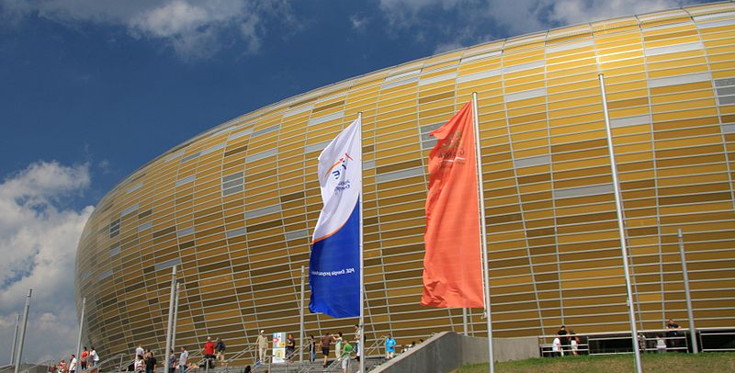
At the time of writing there are no immediate plans to make any major changes to the stadium other than cosmetic upgrades. If anything changes we’ll update this section accordingly.
